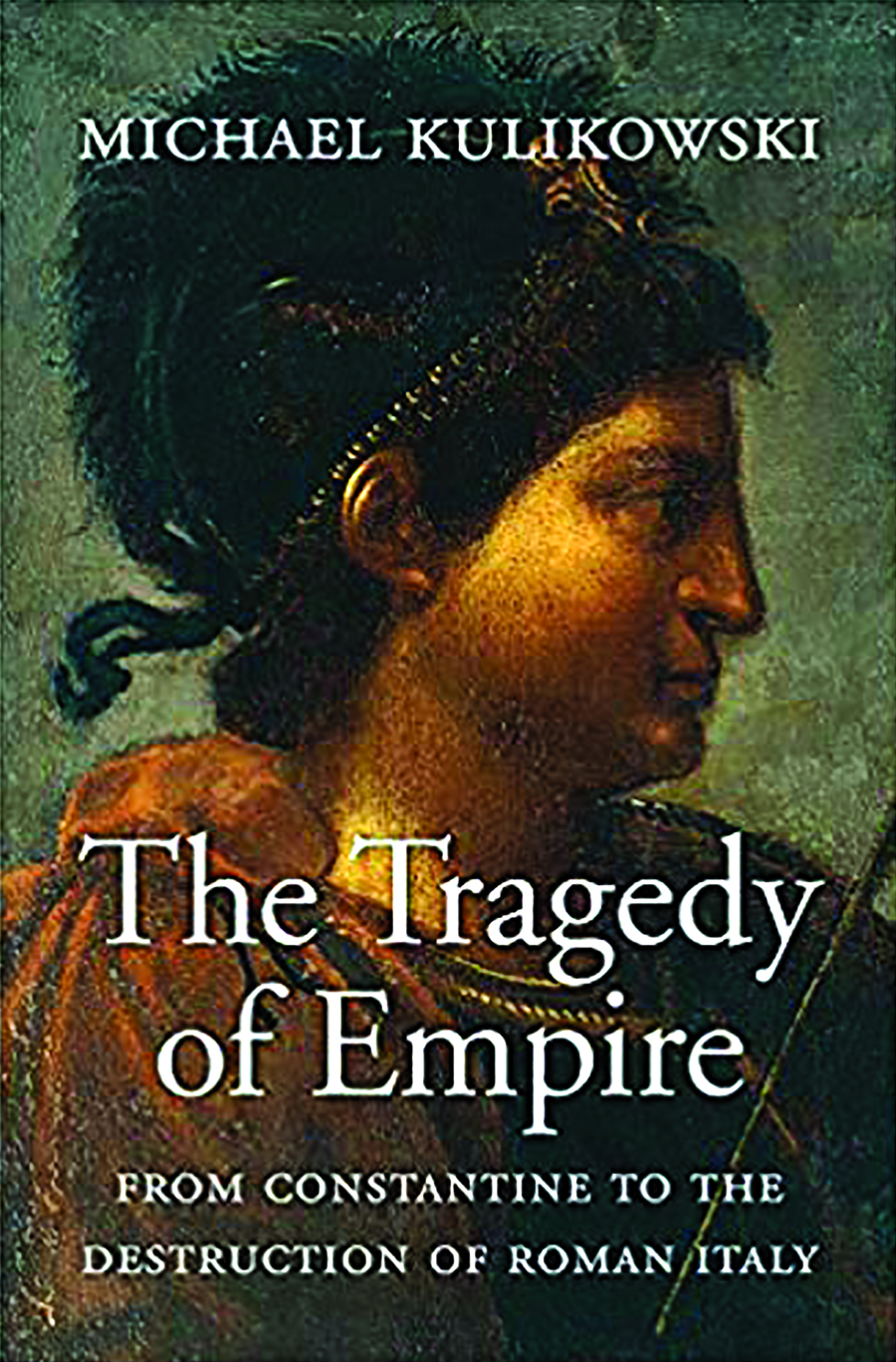Politically correct scholars now avoid speaking of the fall of the Roman Empire. They insist that the Western Roman Empire disappeared through a process of gradual evolution and that Roman emperors were far less important than traditional scholars had believed. Allegedly, the Visigoths, Ostrogoths, Vandals, and other “barbarians” who founded kingdoms in the former territory of the Western Roman Empire were already Romanized and ruled much as the emperors had. In fact, the revisionists consider these barbarians to have been less oppressive rulers than the Romans, who had imposed high taxes, restrictive laws, the Latin language, and orthodox Christianity. In these scholars’ view, what happened between the fourth and seventh centuries was not “the fall of the Roman Empire,” traditionally dated to 476, but “the transformation of the ancient world.”
The history of this period is the subject of Michael Kulikowski’s The Tragedy of Empire: From Constantine to the Destruction of Roman Italy. Although Kulikowski is a recognized scholar in the field, this book is aimed at a general readership, omitting notes (whether foot- or end-) and including a section of attractive photographs with intriguing captions. Some readers may be intimidated by the many Roman and barbarian names in the text and by Kulikowski’s lengthy treatment of the scholarly literature, but his prose is lively. Even though I knew what was going to happen, I was interested to see how he would tell it and sometimes to figure out (without notes to help) where his interpretations came from.
The book’s melodramatic title suggests that Kulikowski is a traditionalist, and he says in his “Further Reading” section that “the present volume covers ‘the fall of Rome’ not the ‘transformation of the ancient world.’” Yet his narrative is mostly transformationist, though unlike most such historians, he emphasizes the importance of individual people. He mentions many personal names because he thinks Roman history after Julian (361-363) was chiefly determined not by emperors but by groups of senior officers and officials. In his opinion, such “factions” chose most emperors for their pliability and severely limited emperors’ freedom of action. Eventually, these groups in the West, though not in the East, decided that they preferred barbarian kings to Roman emperors, with the result that the Western Empire fell and the Eastern Empire (later known as the Byzantine Empire) persisted.

This interpretation seems, to me, mainly mistaken. Groups of officers usually chose emperors only out of necessity in the absence of an obvious heir, and most of the emperors they chose, including Valentinian I (364-375), Marcian (450-457), Leo I (457-474), Majorian (457-461), and Anastasius I (491-518), were capable and assertive. Leo and Anastasius repeatedly subdued rebellious generals in the Eastern Empire. In fact, the weakest emperors were the sons or other relatives of previous emperors, and even they usually overcame rebellious officers and officials. While Kulikowski assumes that the generals and officials were so powerful that nobody could have prevailed without their support, our ancient sources depict them as much less powerful than emperors and overwhelmingly hostile to barbarian rule.
Kulikowski tends to dismiss or reinterpret the sources’ opinions. For instance, he thinks that Theoderic, the Ostrogoth king of Italy from 493 to 526, punished a faction of Roman senators for promoting another Ostrogoth as his heir. But no source says anything of the kind, and one of the accused senators, Boethius, claimed he was charged with “hoping for Roman liberty,” evidently meaning rule by the Eastern Empire. Kulikowski also asserts that after the Eastern emperor Valens died in battle in 378, a faction proclaimed Theodosius I his successor in a “coup.” But Theodosius had no known supporters, and the sources we have say he was chosen by the Western emperor Gratian. Bizarre though it may seem today, Gratian appears to have been influenced by a prophecy that the name of the next Eastern emperor would begin with ‘THEOD.’ While Kulikowski dismisses this prophecy as “ex post facto,” several good sources say that fear of being overthrown by someone with such a name had already led Valens to execute many officials and generals, including Theodosius’s father, Theodosius the Elder.
Kulikowski’s skepticism about this prophecy is part of his general reluctance to acknowledge the importance of superstition and religion in a highly superstitious and religious age. A good postmodernist, he rejects any idea of “a single truth somewhere ‘out there’ awaiting the intellection of human minds to discover it” and deplores that orthodox and Arian Christians refused to agree to disagree over whether Christ was fully divine. Deplorable or not, this disagreement, which contemporaries considered fundamental to the Christian faith, was probably the main reason orthodox Romans disliked and distrusted barbarians, who were almost all Arian or pagan. When Eastern Roman armies invaded Vandal Africa in 533 and Ostrogoth Italy in 536, many Africans and Italians received them with enthusiasm, and the Eastern army that invaded Visigoth Spain in 552 was invited there by Spanish rebels.
Kulikowski is right to disagree with the transformationists who regard Roman rulers merely as oppressors and who reject the importance of individuals in history. But he overestimates the power, selfishness, and factionalism of Roman officials and officers, whom he imagines almost as a clutch of mafia families, and underestimates their loyalty to their emperors and their religion. By comparison with Romans, barbarian officers (no barbarian civil officials are known) were much more self-interested and much less loyal to the empire, which they largely regarded as a black box that produced loot. After a struggle, the Eastern Roman emperors managed to free themselves from barbarian officers, with the turning point coming when Leo killed two barbarian generals in 471. But a barbarian general dismissed the last Western emperor in 476. After that, Roman civilization in the West gradually crumbled, as barbarian rulers looted what had been the empire without much regard for the complex government, economy, and culture that had made it work.
Warren Treadgold is a National Endowment for the Humanities professor of Byzantine studies at Saint Louis University.
